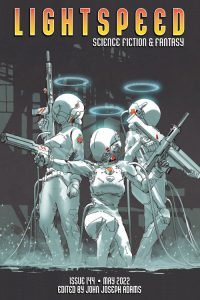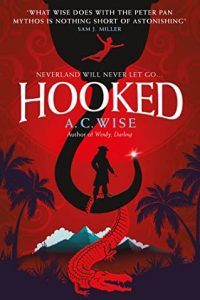Alexandra Pierce Reviews Psyche and Eros by Luna McNamara
 Psyche and Eros, Luna McNamara (William Morrow 978-0-06329-507-0, $30.00, 352pp, hc) June 2023.
Psyche and Eros, Luna McNamara (William Morrow 978-0-06329-507-0, $30.00, 352pp, hc) June 2023.
In her debut novel Psyche and Eros, Luna McNamara plays with a mythological story to create something quite delightful. In the usual telling of the myth, Psyche is the beautiful youngest daughter of an unnamed king. McNamara chooses to connect her to some of the big names of mythology, fitting her story into the events around the Trojan War. This doesn’t have a huge impact on the story, but it does bring an extra frisson when Psyche meets, for example, Iphigenia. As well, her story revolves around the idea of love and marriage and loyalty, as do the stories of Helen, Menelaos, Clytemnestra, and Agamemnon; Psyche and Eros provide a counterpoint to the bitterness and betrayal usually found in those stories.
In both myth and novel, an oracle is proclaimed regarding Psyche; in the myth, it comes when she is an adolescent, and the first part declares that she will marry a monster whom the gods themselves fear. McNamara changes this to have the prophecy occur at her birth, and also changes the verb: rather than marry, Psyche will conquer the monster. In response, rather than despair, Psyche’s father takes the unusual step of providing his daughter with weapons training, preparing her for her fate. In an ancient Greek context, this is ridiculous – as far as we know, women weren’t trained to fight – but McNamara neatly sidesteps this by bringing in the one woman who did: Atalanta, who joined the Argonauts on their quest. This was an inspired way of allowing Psyche to be trained, and still remaining within contextual constraints.
The second part of the oracle in the myth states that Psyche must be abandoned on a mountain. Her royal parents despair but agree, and then rather than being killed she is transported to a wondrous palace. In McNamara’s story, a monster ravages the countryside, and the price of cessation is Psyche being abandoned on a mountainside. Psyche agrees to this, seeing it as her fate being fulfilled; but, instead of fighting, she is transported to an intriguing house set into a cliffside. In both cases, she learns that she is now married to someone who only visits her at night, and whom she may never set eyes on. He names himself Cupid – the Latin name for Eros.
McNamara’s choice to have Eros narrate some of the story is charming, making this a story of a couple experiencing love and loss, rather than being from the perspective of just one individual who, after all, could be mistaken or fooled. This Eros is a primordial one – no cute little Cupid born of Aphrodite – who emerged from Chaos and is brother to Eris, goddess of discord. Eros doesn’t generally play with his ability to spark desire, although he is sometimes begged for favors by other gods. He’s not that interested in humans, seeing them as mayflies. He falls in love with Psyche when he is meant to be cursing her on Aphrodite’s behalf: he accidentally pricks himself on the arrow, receiving the curse himself. This curse is twofold: one, to fall in love with Psyche; two, if they ever look at each other, they will be driven apart forever. Hence, the injunction against Psyche ever seeing Eros.
McNamara and the myth both have Psyche break her promise, which in the novel brings on the rest of the curse – Eros is transported away from Psyche, and Aphrodite locks him in an Olympian storage cupboard. Both stories have Psyche undergoing various trials, to convince Aphrodite to lift the curse, until eventually they can live happily ever after. The trials themselves are one of the areas in which McNamara follows the mythology most closely; this Psyche is a much more resilient one than in the myth.
Having Psyche trained by Atalanta, and Eros be a primordial and world-weary god, makes both much more mature than in other versions of the story. As a mortal Psyche cannot, of course, compare to Eros in experience; but she is also no shy young girl with no experience of the world, captivated by a magic house and an invisible lover whispering sweet nothings. Indeed, Psyche strikes Eros with a poker when he first visits her. Their relationship feels – not equal, because of the inherent imbalance in their status, but certainly less wildly inappropriate. Set against the relationships of Helen and Menelaos, and Agamemnon and Clytemnestra – let alone those of Zeus and his many conquests, Aphrodite and hers, and the attitudes of most of the gods – Psyche and Eros are a fierce example of the power of love, fidelity, and determination.
Like Claire North in her Songs of Penelope saga, McNamara takes ancient mythology and, making judicious alterations, creates something that is recognisable yet new and, yes, more modern. McNamara is following in the tradition of Euripides and Apuleius (as is North) –bringing myths into the contemporary world – and I for one am here for it.
Alexandra Pierce reads, writes, podcasts, cooks and knits; she’s Australian and a feminist. She was a host of the Hugo Award winning podcast Galactic Suburbia for a decade; her new podcast is all about indie bookshops and is called Paper Defiance. Alex has edited two award-winning non-fiction anthologies, Letters to Tiptree and Luminscent Threads: Connections to Octavia E Butler. She reviews a wide range of books at www.randomalex.net.
This review and more like it in the July 2023 issue of Locus.
 While you are here, please take a moment to support Locus with a one-time or recurring donation. We rely on reader donations to keep the magazine and site going, and would like to keep the site paywall free, but WE NEED YOUR FINANCIAL SUPPORT to continue quality coverage of the science fiction and fantasy field.
While you are here, please take a moment to support Locus with a one-time or recurring donation. We rely on reader donations to keep the magazine and site going, and would like to keep the site paywall free, but WE NEED YOUR FINANCIAL SUPPORT to continue quality coverage of the science fiction and fantasy field.
©Locus Magazine. Copyrighted material may not be republished without permission of LSFF.







